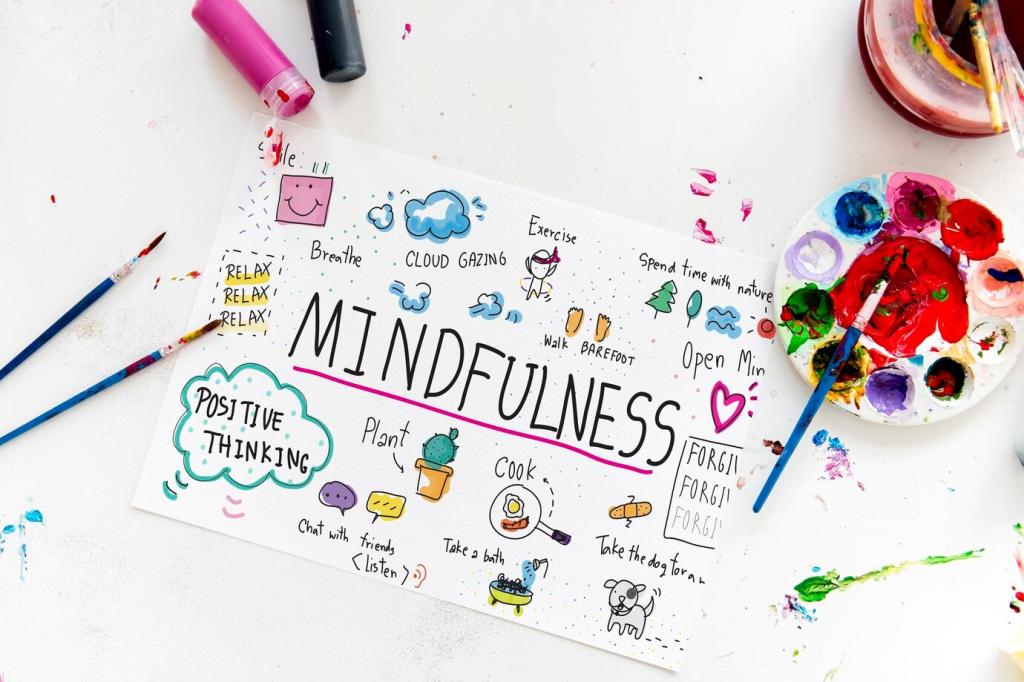
Strategies for Building Emotional Resilience
Emotional resilience is the capacity to adapt and bounce back from life’s setbacks, stress, and challenges. Building emotional resilience empowers individuals to handle adversity with courage, maintain a positive outlook, and nurture overall mental well-being. Effective strategies are essential for strengthening this vital quality, enhancing not only personal growth but also interpersonal relationships. This page explores practical and evidence-based approaches to cultivating emotional resilience for a more balanced and fulfilling life.
Journaling for Insight
Journaling is a powerful practice for discovering patterns in your emotional responses. By taking the time to write about your experiences, feelings, and reactions, you gain a clearer understanding of triggers and recurring themes in your emotional life. This self-exploration creates a space for reflection, helping you identify both constructive and unhelpful coping mechanisms. Over time, a journal serves as a personal guide, offering perspective on growth and the effectiveness of different strategies you employ during stressful times. Journaling does not require literary skill; it is most effective when approached with honesty and openness, encouraging genuine self-discovery and insight.
Mindfulness Meditation
Mindfulness meditation involves focusing on the present moment without judgment, which enhances self-awareness and emotional regulation. When you practice mindfulness, you train your attention to observe thoughts and feelings as they arise, rather than reacting to them automatically. This increased awareness helps interrupt unhelpful patterns and promotes a sense of calm. Mindfulness can be practiced in structured sessions or informally throughout daily life, such as noticing the sensations of your breath or the environment around you. With consistent practice, mindfulness increases your capacity to respond thoughtfully to difficulties, promoting a grounded and resilient mindset.
Feedback from Trusted Individuals
Gaining perspective from people you trust can shine light on your blind spots and broaden your self-understanding. Constructive feedback about your behaviors and emotional responses helps you recognize patterns you might otherwise miss. Trusted friends, family members, or mentors can offer observations that challenge your assumptions and support your personal growth. Accepting feedback with openness is essential; it may be uncomfortable at first, but over time it fosters increased self-awareness and deeper, healthier relationships. Ultimately, external feedback complements self-reflection, supporting a more complete and realistic sense of self.
Previous
Next
Strengthening Support Networks
Cultivating strong, positive relationships requires time and effort. Genuine connections are deepened through active listening, empathy, and vulnerability—sharing your authentic self while being receptive to others’ experiences. Prioritizing quality over quantity, it’s beneficial to nurture relationships that are trustworthy, supportive, and non-judgmental. Investing in these connections not only provides comfort during crises but also creates a network that celebrates your successes. Overcoming the hesitation to reach out can be challenging, but sustained commitment to open communication fosters resilience through shared strength and understanding.

Practicing Gratitude
Regularly reflecting on aspects of life for which you are grateful enhances positivity and emotional well-being. Gratitude shifts attention from what is lacking or stressful to what is nourishing and encouraging. Practicing gratitude can be as simple as noting three good things that happened each day or expressing thanks to others for their kindness. Over time, this habit rewires your brain to notice positives more readily, reducing the influence of negative emotions. Gratitude serves as an emotional anchor, providing perspective during difficult times and strengthening your capacity to navigate adversity.

Reframing Negative Thoughts
When confronted with setbacks, unhelpful thought patterns can amplify distress and erode resilience. Reframing involves consciously challenging negative beliefs and considering alternative interpretations. For example, viewing a mistake as an opportunity to learn, rather than a failure, can motivate growth and persistence. This cognitive shift encourages balanced thinking, empowering you to respond constructively instead of being overwhelmed by negative narratives. Through practice, reframing becomes a natural tool, enhancing your confidence and willingness to take on challenges with optimism.

Setting Realistic Expectations
Resilience is supported by expectations that are both challenging and attainable. Unrealistically high standards can lead to disappointment and self-criticism, while too-low expectations may limit growth. Striking a balance involves acknowledging your abilities and limitations and adjusting goals as needed. By setting realistic, flexible expectations, you allow room for mistakes and progress, reducing pressure and promoting self-compassion. This mindset fosters perseverance in the face of setbacks, empowering you to adapt to changing circumstances with a constructive perspective.

Breaking Challenges into Steps
Large problems can feel overwhelming and provoke anxiety, but dividing them into smaller, manageable steps makes them more approachable. This approach allows you to focus on concrete actions rather than being paralyzed by the magnitude of the issue. By systematically addressing one step at a time, you experience progress, which boosts motivation and confidence. Each small success provides evidence of your ability to overcome obstacles, reinforcing a resilient mindset. Over time, this strategy transforms daunting circumstances into achievable tasks, promoting ongoing growth.

Seeking Creative Solutions
Adapting to adversity often requires thinking beyond conventional responses and considering innovative approaches. Encouraging creativity in problem-solving means being open to new ideas, experimenting with unfamiliar methods, and learning from trial and error. Challenging situations become opportunities to develop resourcefulness and ingenuity. Resilient individuals are willing to take calculated risks, learning valuable lessons from failures as well as successes. Cultivating creative problem-solving not only improves outcomes in the present but also equips you with a flexible attitude ready for future uncertainties.
Managing Stress Effectively
Relaxation practices such as deep breathing, progressive muscle relaxation, or visualization help lower physiological tension and quiet the mind. Incorporating short moments of relaxation throughout your day prevents the accumulation of stress and promotes emotional balance. These techniques release built-up energy, create a sense of calm, and restore focus. Regular practice improves your ability to remain composed under pressure, reducing the likelihood of impulsive or unhelpful reactions. Adopting relaxation exercises provides practical relief while strengthening your resilience in the face of ongoing demands.
Previous
Next

Committing to Continuous Growth
01
Feedback, whether positive or constructive, offers valuable information for self-improvement. Viewing feedback as a tool rather than a judgment allows you to learn from others’ perspectives, identify areas for development, and refine your approach to challenges. Actively seeking and welcoming feedback requires humility and courage, but leads to greater self-awareness and adaptability. This openness strengthens your willingness to experiment, take risks, and persist in the face of difficulty, reinforcing a resilient mindset that is responsive to change.
02
Acquiring new skills fosters confidence and provides additional resources for handling adversity. Each new competency, whether personal or professional, broadens your capabilities and enhances self-efficacy—the belief in your ability to influence outcomes. Learning can take many forms, from formal education to informal experimentation or hobbies. Embracing the discomfort of being a beginner and persisting through initial setbacks builds grit and flexibility, key ingredients of resilience. When you invest in ongoing learning, you equip yourself with tools and perspectives to weather any storm.
03
Regular reflection on your growth ensures that lessons from past experiences are integrated into future actions. Taking time to acknowledge your achievements, identify areas for improvement, and celebrate your resilience builds self-confidence and motivation. Reflection provides clarity on values and goals, guiding you in making intentional choices aligned with your evolving needs. This mindful approach to growth prevents complacency and encourages continuous evolution, ensuring your resilience deepens over time.
